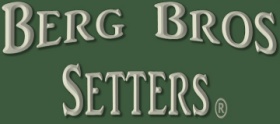Puppy Selection

Puppy Selection

I’ve closely watched and kept records on the progress of hundreds of pups. Those records clearly and conclusively show that it is absolutely impossible at 8, 10, 12 weeks of age to pick out the best pup or pups, no matter who you are or what you know.
~ John Wick, The Tree Dog Encyclopedia
Ben and I have evaluated hundreds of dogs for breeding purposes over the years. We keep at least one pup out of every litter and in many cases kept multiple pups or even entire litters. We long go came to the same conclusion as Mr. Wick. So, given your selection of a puppy is a decision you will live with (literally) for 12-15 years, what can you do to aid the selection of a pup that is a great fit for your family?
Key Considerations
Elite breeding promotes intelligence, biddability, and great natural ability. These attributes are key regardless of if you are a novice or a pointing dog enthusiast.
There is considerable variance across most traits in the Setter breed. You should match your selection (select traits) that are ideal considering the area of the country where you hunt, and the type of game birds you hunt. The ideal physical attributes are not the same for a pheasant hunter and a grouse hunter. The ideal fit is even more precise for those who hunt multiple species. .
Consistency and the level of natural ability varies considerable within any breed and there can be significant differences between litters produced by any two breeders. The process and degree of selectivity used by the breeder to select dogs for their breeding program varies substantially. You should learn about the breeders selection practices.
The internet makes it quite difficult to identify the breeders that follow best practices. You can overcome this by asking the right questions and also ask for references. Anyone can come up with a couple people that are happy with their dogs. There are a number of internet forums where you can ask about breeders. You can also ask the breeder for a dozen names without contact information and then select 3-4 names and ask the breeder for contact information.
Choose the right breeder and/or litter. While picking a puppy is highly speculative, you can definitely identify the best breeders and best litters. While there are no certainties, even with repeat litters, the best litters are products of highly selective breeding. Selective in this context means that the parents represent the elite of the breed. By definition, this means one in many and the only way for a breeder to consistently maintain an elite level in their kennel is to evaluate numerous prospects to find elite individuals to be part of their program. This is where you will find considerable difference in breeding practices if you simply quiz breeders on how they evaluate breeding prospects and how many they evaluate to find one worthy individual.
Match specific traits to your situation. It is important to consider the area of the country where you hunt, and the type of game birds in order to identify litters with the best attributes for your type of hunting. For example, the ideal ideal size, gait, and specific bird handling attributes vary depending on where you hunt and what you hunt. Other factors like Range, stamina and heat tolerance should be considered in the context of the type of hunting you do as well. The most challenging aspect of picking a ideal puppy is not selecting an individual. The difficult part is identifying a litter is most likely to produce consistency across the traits you prefer as well as the traits that are ideal in terms of performance.
Arm yourself with the right questions. When researching litters/breeders every breeder websites tends to claim they are producing the best of the breed. That’s a mathematical impossibility but you can sort through the rhetoric with a few questions.
What traits are given the most weight and how does this fit with your needs?
What is the breeders selection process? Do they hold on to a handful of pups over the the past decade a chose 3 or 4 to breed or did they evaluate several pups and retain only the individuals that were well above average across all the relevant traits?
How much experience does the breeder have. Breeding dogs is like anything else. Research, exposure to a wide variety of related elements, and the lessons learned through experience are all valuable to the end product.
What has the breeder done to help assure consistency? Is this a repeat litter. How much experience do they have with this line and how many different lines are present within 3-5 generations. Good breeders will be able to articulate their plan to elevate the level of consistency they are producing.
Ask for references. Anyone can come up with three names. Ask for several names without contact information. Then, select 3 at random and ask for contact information. If you can get a few references of people that hunt the same type of birds in the same type of terrain that would be ideal.
Please note: We are a licensed breeder. Any English Setter for sale by Berg Brothers Setters will have a vet check and health certificate. Check out this article about crate training your new pup.

